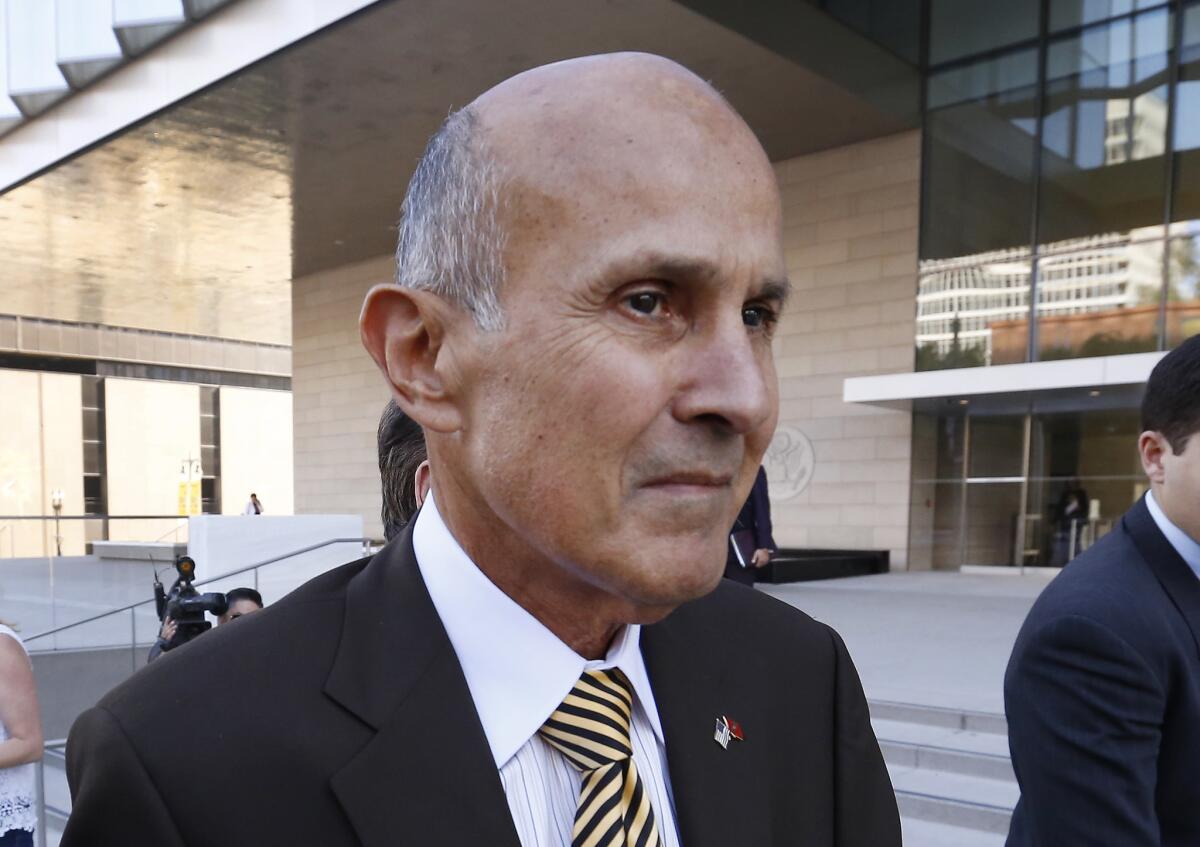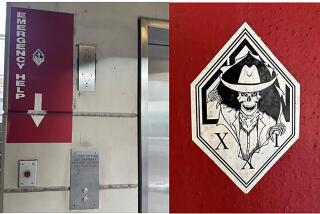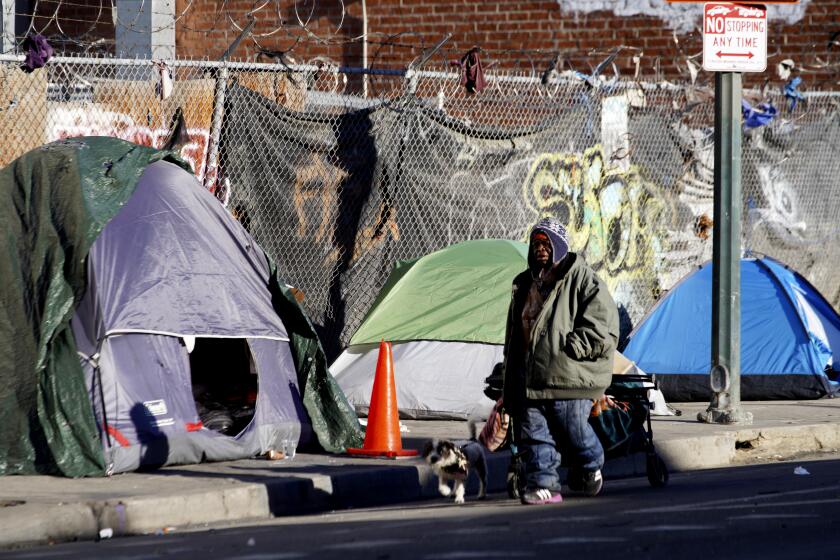Former L.A. County Sheriff Lee Baca implicated in fraud scheme, court documents allege

Several times, the witness heard the well-connected gas company owner on the phone or heading to meetings with “the boys.”
The owner bragged that this network of law enforcement officials he began building in the late 1990s protected him while he played games with the Internal Revenue Service.
Lev Aslan Dermen’s influence allegedly reached the highest ranks in local law enforcement: Former Los Angeles County Sheriff Lee Baca has now been implicated in Dermen’s multimillion-dollar fraud scheme, according to a court filing by the U.S. attorney’s office in Utah.
Federal prosecutors say the witness, Jacob Kingston, would testify that he once saw Dermen make a cash payment to Baca at a dinner. Kingston is cooperating with federal authorities after recently accepting a plea deal in the case.
The revelations add another blemish to the reputation of Baca, the once-towering law enforcement figure who spent 14 years heading one of the nation’s largest police agencies. He stepped down in 2014 amid increasing controversy and later was indicted on charges stemming from a plot to thwart an FBI investigation into abuses by deputies working in the county’s jail.
Baca was sentenced in 2017 to three years behind bars after a jury found he oversaw a plan to interfere with the FBI investigation and later lied to prosecutors about his role. He remains free while waiting for the U.S. Supreme Court to decide whether to take up his appeal.
Baca was the last in a group of Sheriff’s Department deputies and commanders to be accused of playing a role in the 2011 fraud scandal, which involved hiding an inmate who was an FBI informant and threatening to arrest the agent who was leading the investigation. All 10 of the people charged in the case either pleaded guilty or were convicted.
Baca’s attorney, Nathan Hochman, declined to comment on the latest allegations in Dermen’s ongoing criminal case.
Mark Geragos, one of Dermen’s defense attorneys, called Kingston’s statements implicating Baca a “fairy tale.”
“The polygamist liar who is a source for that fairy tale about Baca also made up demonstrably false stuff on his own family members and is a felon facing life,” Geragos said.
Kingston, chief executive of Washakie Renewable Energy and a member of a Utah polygamist group, admitted in court papers to bilking the U.S. of more than $500 million in renewable-fuel tax credits. He pleaded guilty in the scheme but has not yet been sentenced. His attorneys could not be reached for comment.
Three of Kingston’s family members have also taken plea deals.
Dermen, identified by authorities in California as a suspected crime figure also known as Levon Termendzhyan, is expected to go to trial next month — alone. He was indicted a year ago and faces 10 counts, including conspiring to commit mail fraud and launder money. He has pleaded not guilty.
Federal prosecutors are seeking to call Kingston as a witness in the trial.
According to court documents, Kingston began his scheme in 2010 and met Dermen, who controlled several fuel companies, including Noil Energy Group, the following year. In 2012, Dermen offered Kingston the protection of his law enforcement “umbrella,” which would allow them to continue their fraud without consequence. In exchange, Dermen would demand a bigger cut of the proceeds. Prosecutors said Kingston would testify that Dermen “used the shield of the ‘umbrella’ as a sword,” sometimes threatening that a failure to pay the network would result in criminal charges.
At Dermen’s request in 2013, Kingston began to file false claims for renewable fuel tax credits in larger and larger amounts, believing he’d be protected, according to court documents. Starting in 2014, Kingston tried to bribe a high-level Department of Justice official code-named “Commissioner Gordon,” along with prosecutors and judges, by giving cash bribes to an intermediary, court documents show. He also paid bribes to intimidate witnesses and was tipped off about a search warrant in 2016, allowing him and his family to remove their computer hard drives. Kingston would also testify that bribes were doled out in other countries, including to government officials in Belize and a judge in Turkey.
Kingston said he and Dermen used the proceeds from their scheme to buy property in Belize for a casino and in Washington to open a marijuana grow house, court records show. Dermen bought Kingston a house in Utah and a chrome Lamborghini, and Kingston and his brother used $1.7 million of the funds to buy Dermen a Bugatti for his birthday.
Prosecutors expect to introduce text messages and other witnesses to corroborate Kingston’s allegations. In the filing, they referred to text exchanges between Kingston and one of Dermen’s operatives, Santiago Garcia.
“Mr L can’t be in any docs,” Kingston said, according to the filing.
“He is all over the radar you know that all his friends so called friends,” Garcia replied.
“I know. But I can’t turn on him,” Kingston said. “He has people.”
Along with Baca, Dermen’s network allegedly included a former Glendale narcotics detective, a former Secret Service agent and a former Immigration and Customs Enforcement agent. Within that group, all but the Secret Service agent have been embroiled in their own criminal prosecutions.
The former Glendale police detective, John Balian, pleaded guilty last year to charges that he lied to federal investigators about his links to organized crime and tipped off the Mexican Mafia about an upcoming gang sweep, helping a top target avoid arrest. He was sentenced to 21 months in federal prison.
According to court documents prosecutors filed in Balian’s case, Balian and the immigration agent, Felix Cisneros, were close friends and had both worked security for Dermen’s relative.
Kingston said Cisneros was present when Baca accepted the payment, court records show. Mark Werksman, an attorney for Cisneros, said the allegation sounded “preposterous.”
“Felix Cisneros never witnessed or participated in any bribe of any public official anywhere, anytime or anyhow,” he said.
Cisneros was convicted of helping Garcia, the operative, travel back and forth from the U.S. to Mexico. Cisneros was sentenced to a year and a day in prison.
Garcia, a Mexican national with multiple felony convictions, traveled to Mexico in 2013 to negotiate a business deal for Dermen. Upon his return, he was detained at Los Angeles International Airport and his passport and green card were confiscated. Still, he was allowed to remain in the country temporarily, pending his criminal case.
Later, Dermen asked him to go to Mexico again, but Garcia couldn’t travel without his passport. Dermen contacted Cisneros to help.
Cisneros arranged, under false pretenses, for Customs and Border Protection to give Garcia back his passport and then helped him reenter the country. The agent pocketed Dodgers playoff tickets in return.
Times staff writers Joel Rubin and Matthew Ormseth contributed to this report.
More to Read
Start your day right
Sign up for Essential California for news, features and recommendations from the L.A. Times and beyond in your inbox six days a week.
You may occasionally receive promotional content from the Los Angeles Times.







